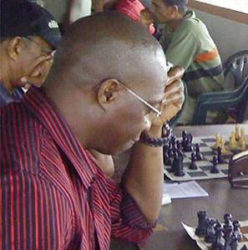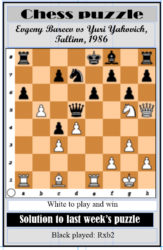Any man who tries to be good all the time is bound to come to ruin among the great number who are not good. – Niccolo Machiavelli, renaissance diplomat and courtier, 1469-1527
 Machiavelli’s quote is timeless, as it is definitive. In today’s world, everything must appear to be democratic, decent, civilized and fair. But beneath such civility, as a best-selling author remarks, lies a “cauldron of dark emotions – greed, envy, lust and hatred.” A game is being played here. On the outside, fairness prevails. On the inside, however, there is a considered appearance of cunning which supposedly resembles a unique game of chess.
Machiavelli’s quote is timeless, as it is definitive. In today’s world, everything must appear to be democratic, decent, civilized and fair. But beneath such civility, as a best-selling author remarks, lies a “cauldron of dark emotions – greed, envy, lust and hatred.” A game is being played here. On the outside, fairness prevails. On the inside, however, there is a considered appearance of cunning which supposedly resembles a unique game of chess.
In its April 13, 2016 edition, Stabroek News reported that the annual general meeting of the Guyana Chess Federation (GCF) would be held on May 15, based on an interview with a member of the constituted body. That meeting has been cancelled, according to Irshad Mohammed, president of the GCF. It is evident that a massive amount of imbroglio surrounds an unimaginative leadership. Who is authorized to speak for whom, and who is not? Apparently, there is a difficulty of knowing the facts. The news of the AGM caught the chess fraternity by surprise, if not immediately, about a week later. No official notification emanated from the secretary of the constituted body, therefore, one was left to assume an AGM would not be held. No effort was made to confirm the report, nor to dispel it. Such is the ugly state of affairs relating to the local chess administration. As far as the column is concerned, the administration sparks of illegality.

Ever since the year dawned, the buzz in chess has been that of representing Guyana at the Azerbaijan Olympiad. Not much, or for that matter, nothing at all, is being said about promoting the popularity of the game locally, which remains one of the principal objectives of the constitution of the GCF. For at least two years, there have been no national junior and senior chess championships. As in 2014, following the Olympiad and the Umada Cup, chess was quietly, conveniently and pathetically, pushed aside. Chess disappeared in 2015.
While a contingent travelled to Norway for the 2014 chess Olympiad, the Umada Cup was contested in Guyana. The Cup is a Caribbean chess competition which is funded in full by FIDE, the governing body of world chess. Now, with the 2016 Chess Olympiad in the air, we learn of innovative and ingenious ways of selecting a current Olympiad team.
As it did in 2014, Guyana may be dispatching a live chess coach to accompany the team. Chess coaches the world over are not known to accompany teams on tour, except for the Candidates and World Championship matches. Further to that, an unknown chess player was selected to represent Guyana at the Tromso Olympiad in 2014, when it was not clear whether she could actually play the game.
 The column, in addition to other Guyanese chess players, had never heard of her. Luckily, she did not play any of the four regulation boards to represent her country. Sadly, we are on course to allow the identical action all over again.
The column, in addition to other Guyanese chess players, had never heard of her. Luckily, she did not play any of the four regulation boards to represent her country. Sadly, we are on course to allow the identical action all over again.
Georgetown does not account for the entire Guyana. If we are desirous of naming a legitimate Olympiad chess team to represent Guyana, adequate notice should be given for the GCF to host an elimination tournament for possible selection of such a team. The federation should not say “selections would be done based on past performances.” Where are these performances? Ronuel Greenidge has not competed in tournament chess since 2014! He should be made to compete for selection on an Olympiad team. What about Clement Corlette, who remains one of our more preeminent chess players to emerge from Lodge? And what about the seasoned Learie Webster who resides currently in Region One and who could be in Georgetown in a flash and Alexander Duncan? They are all excellent chess players and anyone from among the lot can qualify for selection. Berbice has some elite chess players: Kriskal Persaud from Rose Hall Town, is a previous national junior and senior chess champion of Guyana. He performed with distinction at the Umada Cup beating the Trinidadian national champion and the eventual winner of the tournament. He deserves an opportunity to contest an elimination tournament! The Olympiad is scheduled to begin in September, and, therefore, the GCF can complete this task speedily, giving adequate notice to allow rural players to prepare themselves adequately for the competition. If it doesn’t infringe any of FIDE’s rules, our overseas players should be invited to compete. Raymond Singh is active in Canada and possesses a FIDE rating. Marland Wood, Augrey and Trevor Duncan and Louis Wharton, are all active in the tri-state area. And finally, Bartica and Essequibo boast a sprinkling of competent chess player. Shouldn’t they be allowed an equal opportunity to play for Olympiad selection also?
Selection for the 2016 Olympiad chess team should be done in a fair and democratic manner. An elimination tournament for both the male and female teams should be contested. As a chess player, I cannot envisage another angle. The moves should be transparent. The column will not be incapacitated by an Olympiad team which is determined through secrecy, fashioned in undemocratic principles and attuned to bewilder an aspiring chess nation. The column will speak. And appearances do matter. There is time to fashion an elimination round.
Finally, the Frankie Farley supporters expressed their disappointment to the column for the cancellation of the annual general meeting. It is their wish, they indicated, that the meeting be held without further delay.
Chess games
China’s number one chess player Ding Liren played a four-game match with the USA’s Wesley So in Shanghai. Both players are ranked in the FIDE top ten chess players of the world. Ding won by a 2.5/1.5 margin.
White: Ding Liren
Black: Wesley So
1. d4 Nf6 2. c4 e6 3. Nf3 d5 4. Nc3 c6 5. e3 Nbd7 6. Be2 Bd6 7. O-O O-O 8. a4 a5 9. Qc2 b6 10. e4 Nxe4 11. Nxe4 dxe4 12. Qxe4 Bb7 13. Rd1 Qe7 14. Bf4 Rad8 15. Bxd6 Qxd6 16. Ne5 Nxe5 17. dxe5 Qb4 18. b3 Qe7 19. Bf3 Ba8 20. Qe3 c5 21. Bxa8 Rxd1+ 22. Rxd1 Rxa8 23. Qd3 h5 24. f4 Qh4 25. Qg3 Qe7 26. Qd3 Qh4 27. g3 Qh3 28. Qf1 Qf5 29. Qd3 Qh3 30. Qf1 Qf5 31. h4 Kh7 32. Rd6 Rb8 33. Qd1 Kg6 34. Kf2 f6 35. exf6 gxf6 36. Kg2 Qe4+ 37. Kh2 Re8 38. Rxb6 Rd8 39. Qxd8 Qe2+ 40. Kg1 Qe1+ 1/2-1/2.
White: Ding Liren
Black: Wesley So
1. d4 Nf6 2. c4 e6 3. Nf3 d5 4. Nc3 c6 5. g3 dxc4 6. Bg2 b5 7. Ne5 a6 8. O-O Bb7 9. b3 b4 10. Ne4 Nxe4 11. Bxe4 c3 12. a3 a5 13. axb4 axb4 14. Bf4 Nd7 15. Bxc6 Bxc6 16. Nxc6 Qc8 17. Rxa8 Qxa8 18. d5 Bc5 19. Qd3 O-O 20. dxe6 Qxc6 21. exd7 Rd8 22. Rd1 Bb6 23. e4 h6 24. h4 Qe6 25. Qd5 Qg4 26. Kg2 c2 27. Rc1 Qe2 28. Rf1 Bc7 29. e5 Qg4 30. Rc1 Rxd7 31. Qa8+ Rd8 32. Qc6 g5 33. e6 gxf4 34. Qxc7 f3+ 35. Kh2 Rd2 36. Rxc2 Rxc2
37. exf7+ Kg7 38. Qxc2 1-0.
White: Wesley So
Black: Ding Liren
1. e4 e5 2. Nf3 Nc6 3. Bb5 a6 4. Ba4 Nf6 5. O-O Nxe4 6. d4 b5 7. Bb3 d5 8. dxe5 Be6 9. Nbd2 Nc5 10. c3 Be7 11. Bc2 d4 12. Nxd4 Nxd4 13. cxd4 Qxd4 14. Nf3 Qxd1 15. Rxd1 O-O 16. Be3 Rfd8 17. Rdc1 h6 18. Nd4 Bd5 19. f4 Ne6 20. Nxe6 fxe6 21. Bg6 Rac8 22. Bc5 Kf8 23. Kf2 Bb7 24. Bxe7+ Kxe7 25. Rc2 c5 26. Ke3 c4 27. a4 Bd5 28. axb5 axb5 29. g4 b4 30. Ra4 Rb8 31. Be4 b3 32. Rc3 Bxe4 33. Kxe4 Rb7 34. Ke3 Rd1 35. Rcxc4 Rb1 36. Ra6 Rxb2 37. Rcc6 Rb1 38. Rxe6+ Kf7 39. Reb6 Rxb6 40. Rxb6 b2 41. Kd3 Rf1 42. Rxb2 Rxf4 43. Rb7+ Ke6 44. Rxg7 Kxe5 45. Ke3 Ra4 46. Rg6 Ra3+ 47. Kf2 Kf4 48. Kg2 Rb3 49. h3 Rb2+ 50. Kf1 Rb1+ 51. Ke2 Rb2+ 52. Ke1 h5 53. gxh5 Rb5 54. Rg4+ Kf3 1/2-1/2.









